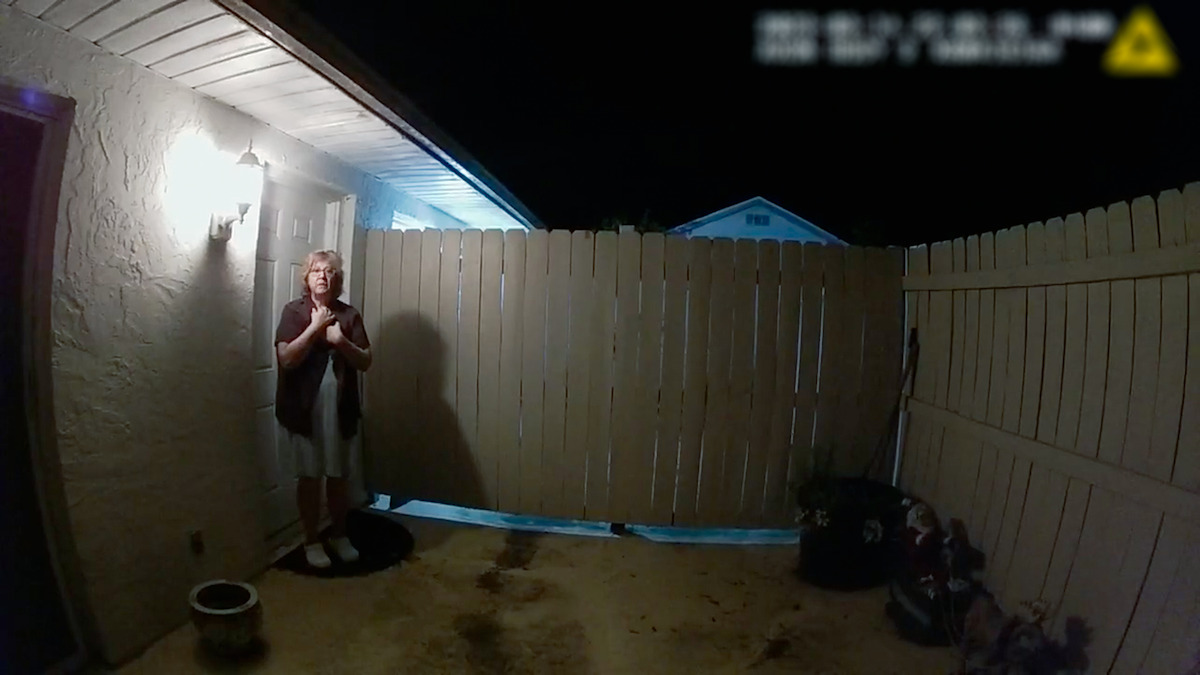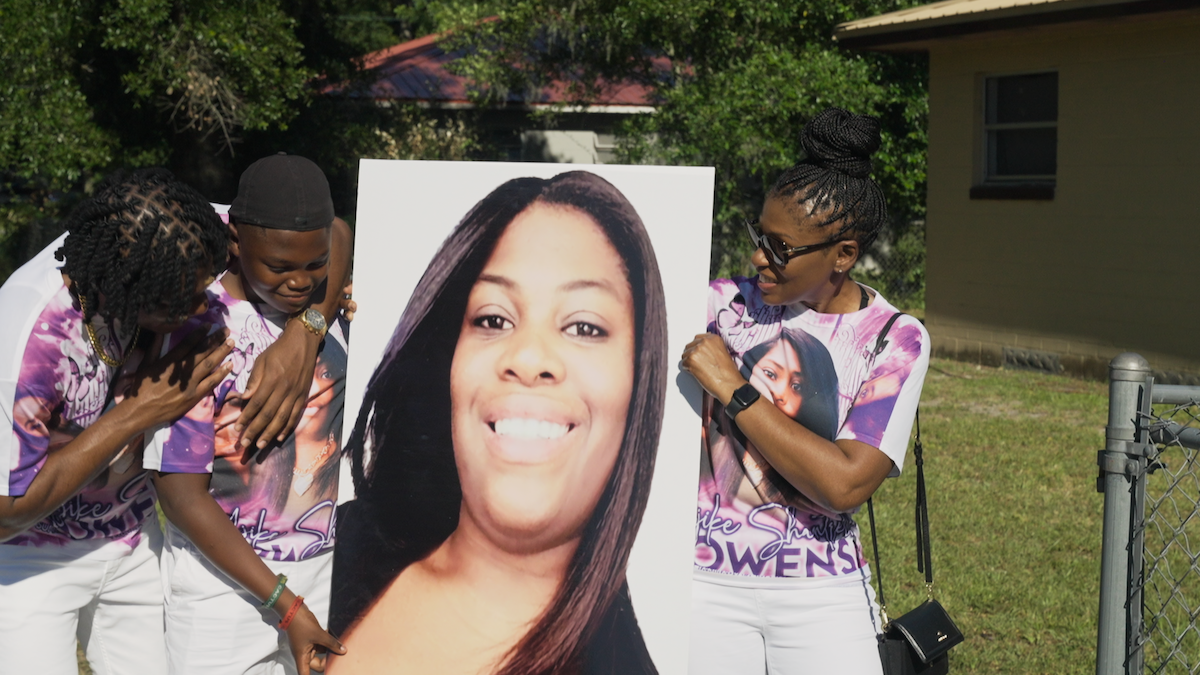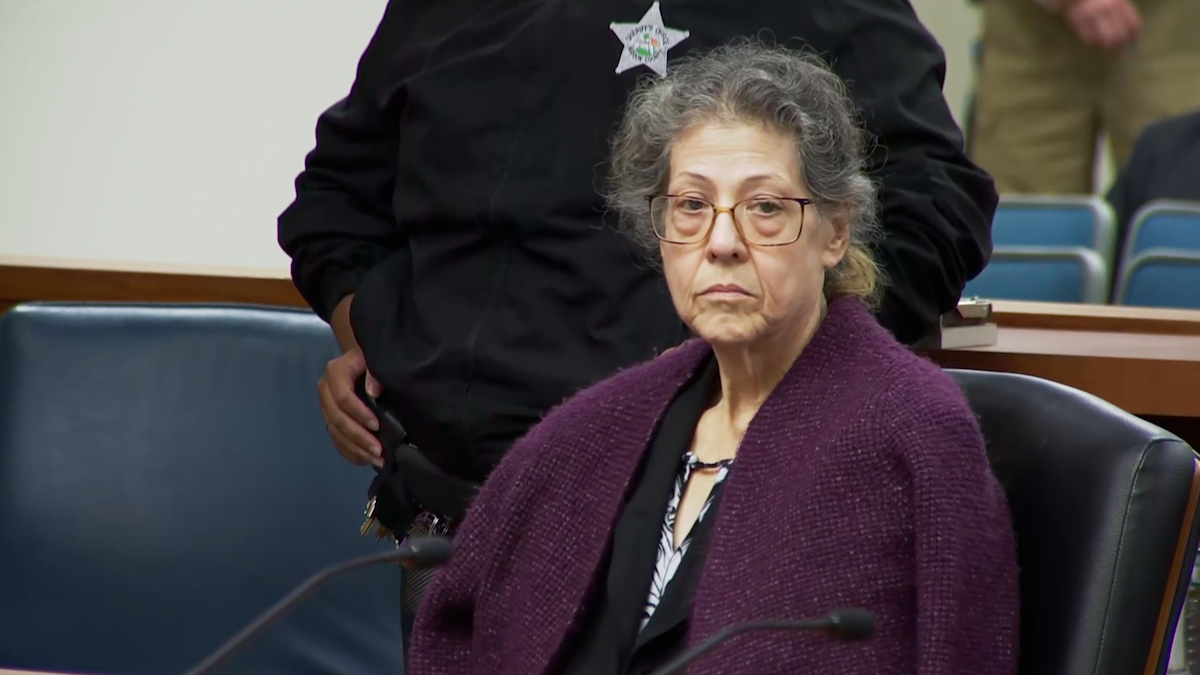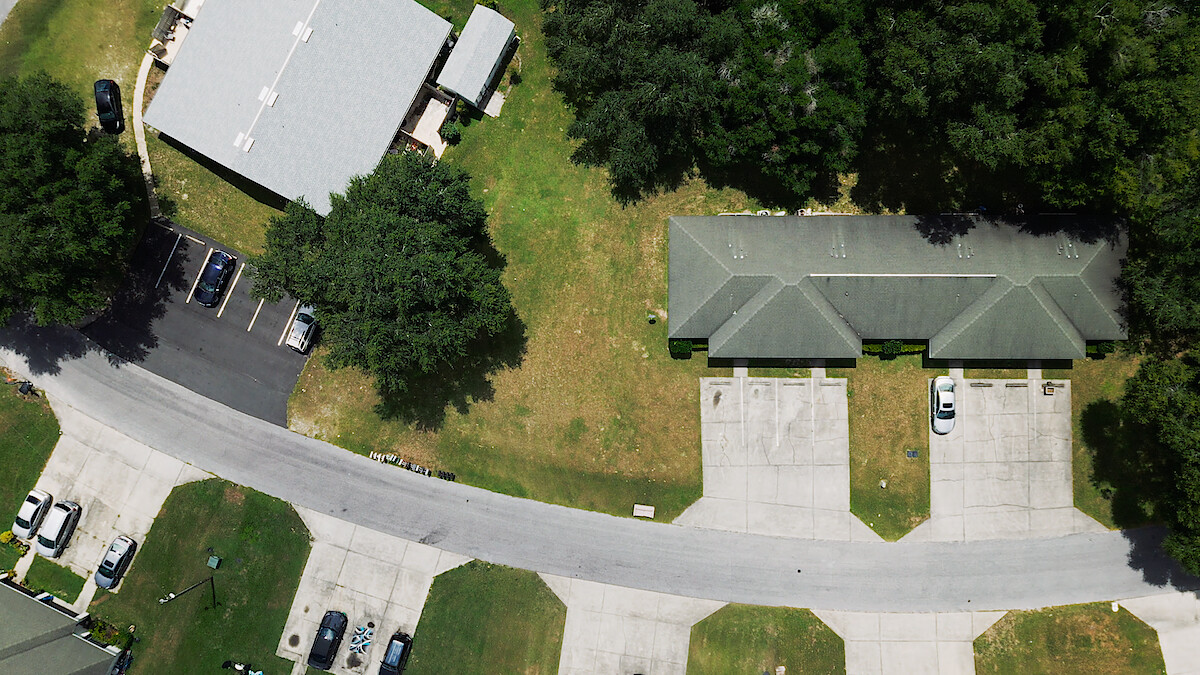For filmmakers and life partners Geeta Gandbhir and Nikon Kwantu and producer Alisa Payne, creating as a collective felt preordained. Long before they knew each other’s work, they were in community with one another as parents whose children attended the same preschool. While they may not have realized it until much later in friendship, the trio were all storytellers in their own right: Payne, a producer of powerful documentaries like the Emmy and NAACP Image Award–nominated Stamped from the Beginning; Kwantu, with two decades of experience as a multimedia, film, and animation producer; and Gandbhir, a director mentored by Sam Pollard and Spike Lee, who she collaborated with as an editor on When the Levees Broke: A Requiem in Four Acts, which would earn her her first Emmy Award. They were united by their drive to tell stories that sought out unseen perspectives, but it was an unfortunate connection to devastating tragedy that led to their latest documentary project, The Perfect Neighbor.
One night in June of 2023, Kwantu’s relative Takema Robinson, a social justice activist, reached out to him and Gandbhir about the devastating killing of Ajike “AJ” Owens, a family friend and beloved mother of four who was raising her children in a tight-knit community in Ocala, Florida. Owens was fatally shot by her neighbor, Susan Lorincz, over a seemingly minor dispute gone wrong, one rooted in Lorincz’s frustration with children playing in a field outside her home. “This shocking crime left my family and me engulfed in grief and confusion,” says Gandbhir. “Ajike’s community was tight-knit, rooted in mutual support and trust. It was heartbreaking to witness how such a close environment could unravel so catastrophically.” Gandbhir, Kwantu, and Payne soon visited Florida with a mission of supporting the family and bringing awareness to the senseless killing, as Lorincz was not initially arrested by local law enforcement. “The Perfect Neighbor is one of those films that we say we wish that we didn’t have to make,” Payne says.
This film is gut-wrenching, but as painful as it was to watch, Geeta was magical in her storytelling. She peeled back every single layer of our story with precision. It was a masterpiece.
Pamela Dias, Ajike Owens’s mother
Owens’s mother, Pamela Dias, says she supported the film from its earliest stages to honor her daughter’s life and turn grief into purpose. “I feel my call to duty, I’m carrying on her spirit,” she says. “Through the film and the Standing in the Gap Fund [a family-led effort that responds to race-based violence by easing financial burdens and supporting community-rooted healing], I believe we raised the awareness about the need for greater understanding, for empathy and community precision as a vehicle to ultimately and hopefully prevent similar incidents from happening. It’s advocating for more compassion in the world, something that we really need in these dark times.”
 What happens in the documentary?
What happens in the documentary?
Directed by Gandbhir and produced by Kwantu, Payne and Sam Bisbee (Daughters), the documentary is told almost completely through police body camera footage, examining the day-to-day goings-on of a neighborhood that often feels as if it exists in a bygone era. “The neighbors genuinely cared for one another. There was a significant bond between the families,” reflects Dias. “We have children growing up together, playing together as they should. Family was at the very cornerstone of the neighborhood, and that’s what made that community very special and a unique place to live.”
Sometimes, the children’s games would spread beyond their own lawns and into a vacant lot located next to Lorincz’s home, a home that stood in contrast to the surrounding residents. “Susan was such an outlier in this community,” says Kwantu. “When there’s a conflict in any way, she’s going to call the police.” Lorincz called law enforcement on the kids numerous times over the years, but the officers initially seemed to side with the children and their families; meanwhile, Lorincz became increasingly combative toward her neighbors. That aggression culminated in a catastrophic encounter in which she shot Owens. The Perfect Neighbor is an innovative and intimate look at the escalating tensions within a community poisoned by prejudice.

That intimate access is culled from hours of body camera footage and audio recordings, which the filmmakers were able to use thanks to a Freedom of Information Act request made by attorneys for Owens’s family, in an effort to shed light on how a conflict over kids playing in a yard could have led to a senseless killing. “There was a lot of footage, and you don’t know what you’re looking at, you don’t know the sequence,” says Kwantu. “You’re watching something that goes from normal to not so normal to ‘Wait, where’s this going?’. When I looked at it, I was just like, ‘I think this is the film.’”
The filmmakers approached Dias about the possibility of turning it into a documentary, with a mission of bringing more awareness and visibility to her daughter’s killing. “I went to Pamela and asked her, is this something she would want to pursue? And she said, yes,” remembers Gandbhir. “I think the trust was built probably along the way, because we were working together to make sure there was some sort of justice for Ajike.” Dias adds: “When Geeta initially approached me about sharing the documentary, at that time I was very much consumed by grief. We didn’t know what was going to happen, but with the prospect of a film, it gave my heart a sense of comfort, and it lightened a little bit of the burden that I was carrying. I actually had something that I could hold onto other than grief.”
Dias emphasizes that Gandbhir continually checked in to ensure the family’s comfort and consent were top of mind. “She was always in constant communication. She wanted to know how we were doing as a family. She would ask if I was OK and comfortable with moving forward with the film, that it was totally up to me,” Dias says.
That hard-earned trust shaped how Dias chose to participate: stepping back from day-to-day decisions while relying on Gandbhir’s judgment. “I had complete trust in Geeta,” Dias says, “so I trusted her to exercise sensitivity, exercise care and professionalism. So I didn’t see the need to be involved in any of the filmmaking details. And the end result truly shows that Geeta’s approach was beyond thoughtful, beyond considerate. And I appreciate Geeta for sharing and telling our story with the utmost respect and care.”
Where does The Perfect Neighbor take place?
The documentary was filmed — or rather, in this case, footage edited together — in Ocala, Florida.
What are “stand your ground” laws?
As they were making The Perfect Neighbor, the filmmakers awaited justice for Owens alongside Dias. Ocala, the city Owens and her four children called home, is less than two hours away from Sanford, where in 2012, the unarmed 17-year-old Trayvon Martin was fatally shot by George Zimmerman. Zimmerman was acquitted, claiming self-defense; the trial called attention to Florida’s “stand your ground” law, which allows individuals to use deadly force if they feel their lives are in danger, even if they can retreat to safety and they are outside their homes.
Laws like this one now exist in one form or another in more than half of the states in the US, but it was Florida’s that attracted the utmost scrutiny after Zimmerman’s acquittal in 2013. A decade later, the killing of Owens ignited a similar nationwide probing of the catastrophic and problematic laws that disproportionately affect Black people. “Hopefully through [Owens’s] legacy we can fight ‘stand your ground’ and other harmful policies,” says Payne. “It was very apparent on the other side of [Susan’s] calls, there were these great people. These are people who are parents raising their children.”
 Who is Ajike “AJ” Owens?
Who is Ajike “AJ” Owens?
“Ajike Owens was a devoted mother of four and a cherished family friend who lived in Ocala, Florida,” Gandbhir says. The film centers Owens through family testimony, photos, and everyday scenes that define her role at home and in the neighborhood. Friends and relatives describe a protective parent who intervened when her children reported disputes with her neighbor, Lorincz.
At its core, The Perfect Neighbor is a portrait of a vibrant, caring mother, immortalizing Owens’s warm and unfading spirit. “It means everything to honor her legacy,” says Dias. “My daughter always would say the world would know her name, and The Perfect Neighbor has made her word come true. Her legacy lives on, and the world will know her name.”
Does the film show the shooting of Ajike Owens?
No. There is no video footage of the moment the gun is fired. The film reconstructs events before and after using interviews, 911 audio, and on-scene police body-camera footage. Viewers see the neighborhood environment, hear urgent calls for help, and watch the police and EMS response.
Dias recalls her first screening of the film — she found it both devastating and demonstrative of the filmmaker’s care. “I was overwhelmed,” she says. “Reliving the sequence of events … my child, fighting for her life, the community’s outrage, my grandchildren — even my own anguish. I sobbed, I sobbed uncontrollably.”
Even in that pain, Dias says the craft was unmistakable — a testament to Gandbhir’s sensitivity and rigor. “This film is gut-wrenching, but as painful as it was to watch, Geeta was magical in her storytelling. She peeled back every single layer of our story with precision. It was a masterpiece.”
 What happened to Susan Lorincz?
What happened to Susan Lorincz?
In the documentary, which begins in the fall of 2022, neighbor Susan Lorincz calls in complaints to police about local children playing noisily and leaving trash on the vacant lot beside her home. These frequent calls to authorities and statements are documented by law enforcement’s body cameras, which the film uses to show the escalation of Lorincz’s complaints.
These 911 calls continued until June 2, 2023, when Lorincz reported that Owens was attempting to break down her door and threatening her life. Just two minutes later, Lorincz called back to report she had shot Owens through the door. Despite life-saving efforts by emergency responders, Owens was later pronounced dead at a hospital. Her death — and the fact that authorities waited days to arrest Lorincz while they investigated whether her actions met the criteria of Florida’s “stand your ground” law — sparked outrage in the local community.
After the investigation, the sheriff’s department arrested Lorincz on June 6, 2023. She was charged with manslaughter with a firearm, culpable negligence, battery, and two counts of assault. In 2024, Lorincz was found guilty of manslaughter and sentenced to 25 years in prison.
The Perfect Neighbor premiered at the Sundance Film Festival where Gandbhir took home the U.S. Documentary Directing Award. Now Gandbhir, Kwantu, and Payne aim to reach a much wider audience, with their film’s urgent examination of the attitudes and policies that continue to inflict devastating consequences on communities. “I hope to inspire a deeper understanding of the consequences of these laws and advocate for changes that can prevent more senseless tragedies in the future,” Gandbhir says.
Dias also hopes the film will help audiences fully understand the “bigger, broader picture” through its emotional storytelling. She hopes viewers will carry AJ’s legacy forward in action. “I want her memory to be a blessing to others. I want it to inspire a positive change in the world,” she says.
A version of this feature originally appeared in Issue 21 of Tudum Magazine.

